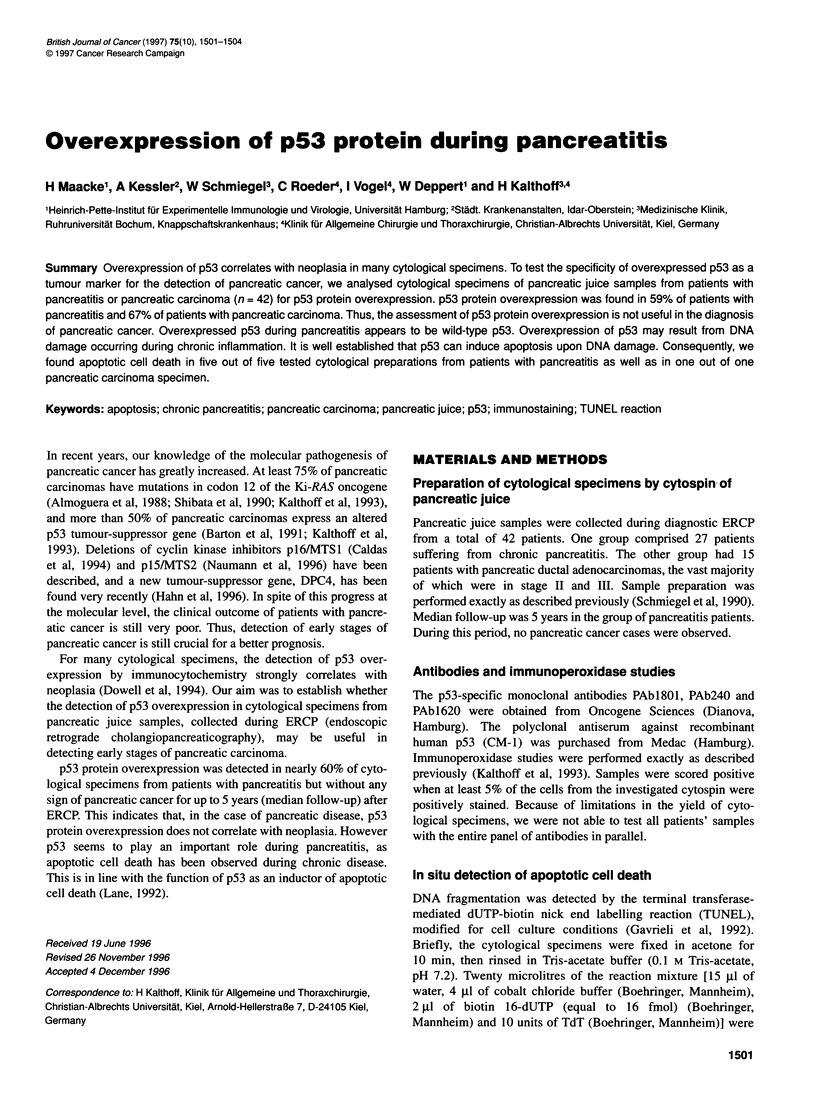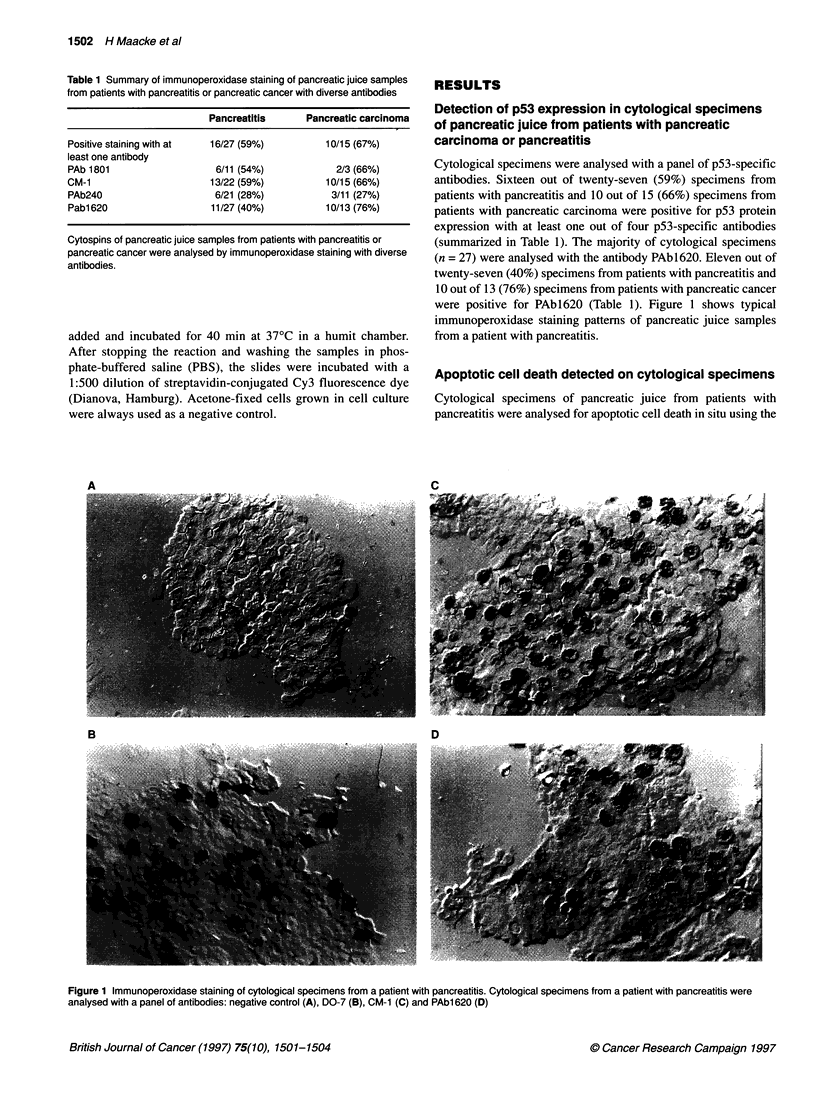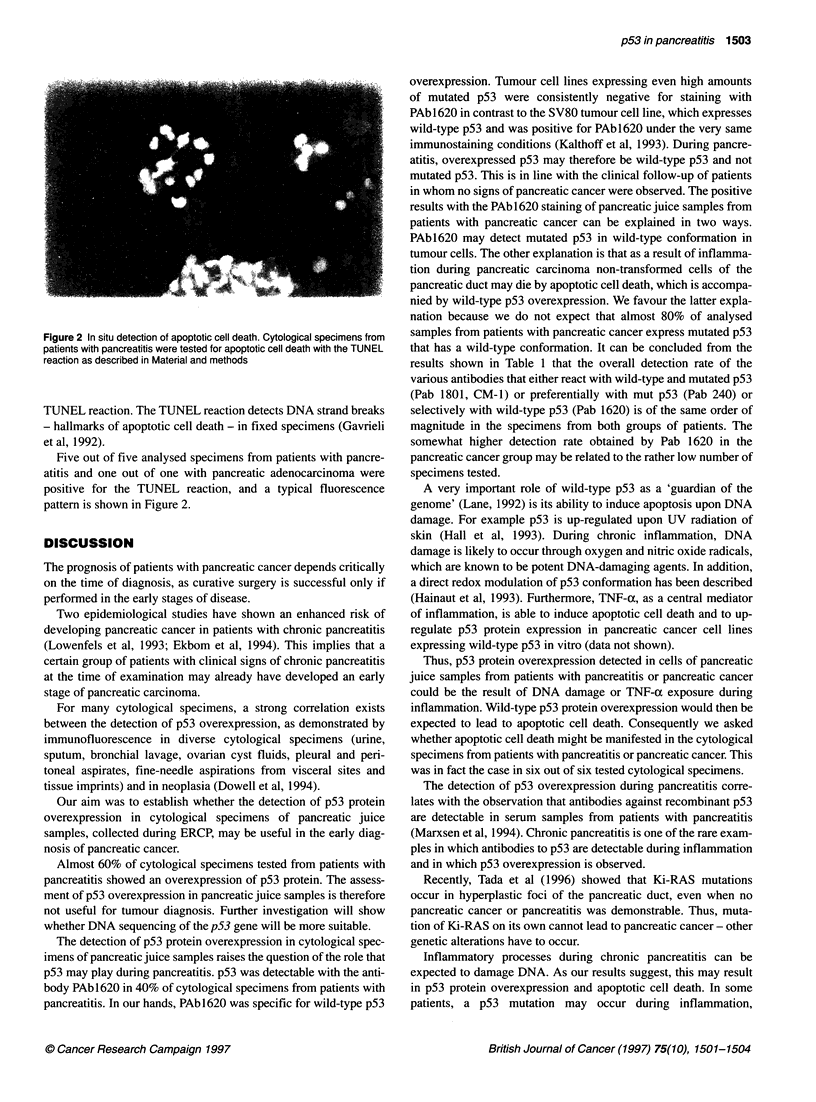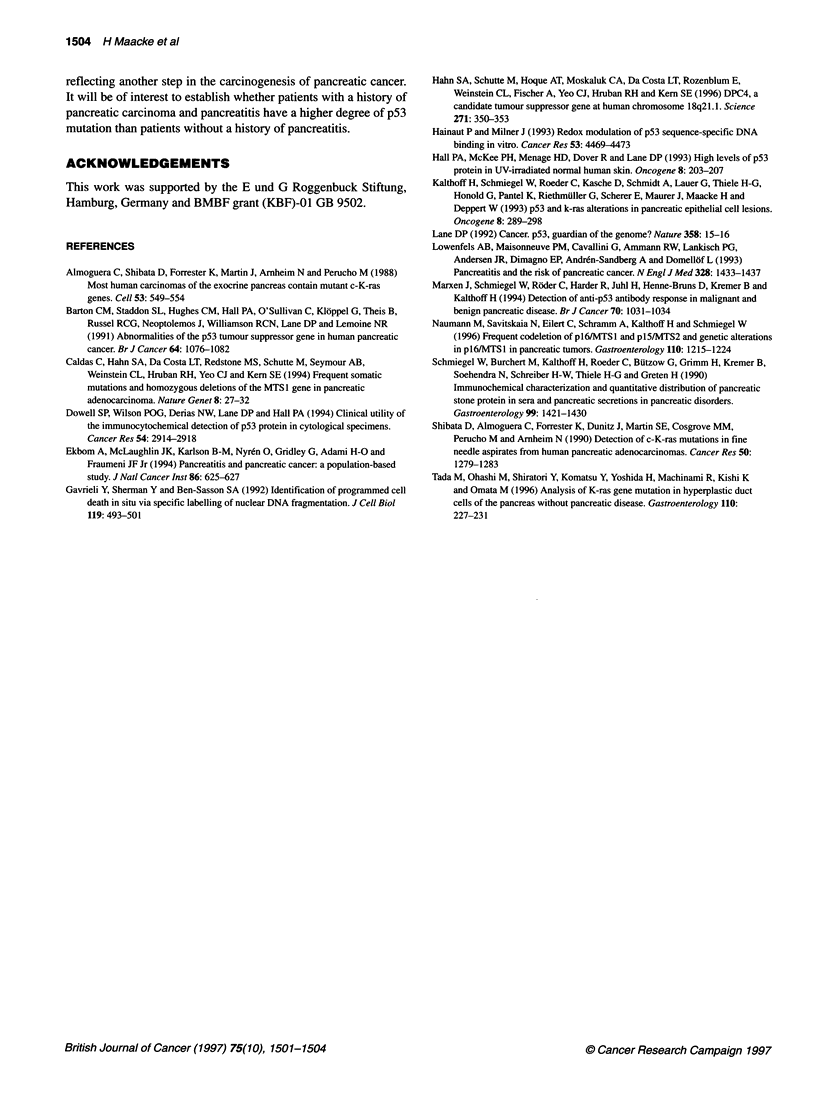Abstract
Overexpression of p53 correlates with neoplasia in many cytological specimens. To test the specificity of overexpressed p53 as a tumour marker for the detection of pancreatic cancer, we analysed cytological specimens of pancreatic juice samples from patients with pancreatitis or pancreatic carcinoma (n = 42) for p53 protein overexpression. p53 protein overexpression was found in 59% of patients with pancreatitis and 67% of patients with pancreatic carcinoma. Thus, the assessment of p53 protein overexpression is not useful in the diagnosis of pancreatic cancer. Overexpressed p53 during pancreatitis appears to be wild-type p53. Overexpression of p53 may result from DNA damage occurring during chronic inflammation. It is well established that p53 can induce apoptosis upon DNA damage. Consequently, we found apoptotic cell death in five out of five tested cytological preparations from patients with pancreatitis as well as in one out of one pancreatic carcinoma specimen.
Full text
PDF



Images in this article
Selected References
These references are in PubMed. This may not be the complete list of references from this article.
- Almoguera C., Shibata D., Forrester K., Martin J., Arnheim N., Perucho M. Most human carcinomas of the exocrine pancreas contain mutant c-K-ras genes. Cell. 1988 May 20;53(4):549–554. doi: 10.1016/0092-8674(88)90571-5. [DOI] [PubMed] [Google Scholar]
- Barton C. M., Staddon S. L., Hughes C. M., Hall P. A., O'Sullivan C., Klöppel G., Theis B., Russell R. C., Neoptolemos J., Williamson R. C. Abnormalities of the p53 tumour suppressor gene in human pancreatic cancer. Br J Cancer. 1991 Dec;64(6):1076–1082. doi: 10.1038/bjc.1991.467. [DOI] [PMC free article] [PubMed] [Google Scholar]
- Caldas C., Hahn S. A., da Costa L. T., Redston M. S., Schutte M., Seymour A. B., Weinstein C. L., Hruban R. H., Yeo C. J., Kern S. E. Frequent somatic mutations and homozygous deletions of the p16 (MTS1) gene in pancreatic adenocarcinoma. Nat Genet. 1994 Sep;8(1):27–32. doi: 10.1038/ng0994-27. [DOI] [PubMed] [Google Scholar]
- Dowell S. P., Wilson P. O., Derias N. W., Lane D. P., Hall P. A. Clinical utility of the immunocytochemical detection of p53 protein in cytological specimens. Cancer Res. 1994 Jun 1;54(11):2914–2918. [PubMed] [Google Scholar]
- Ekbom A., McLaughlin J. K., Karlsson B. M., Nyrén O., Gridley G., Adami H. O., Fraumeni J. F., Jr Pancreatitis and pancreatic cancer: a population-based study. J Natl Cancer Inst. 1994 Apr 20;86(8):625–627. doi: 10.1093/jnci/86.8.625. [DOI] [PubMed] [Google Scholar]
- Gavrieli Y., Sherman Y., Ben-Sasson S. A. Identification of programmed cell death in situ via specific labeling of nuclear DNA fragmentation. J Cell Biol. 1992 Nov;119(3):493–501. doi: 10.1083/jcb.119.3.493. [DOI] [PMC free article] [PubMed] [Google Scholar]
- Hahn S. A., Schutte M., Hoque A. T., Moskaluk C. A., da Costa L. T., Rozenblum E., Weinstein C. L., Fischer A., Yeo C. J., Hruban R. H. DPC4, a candidate tumor suppressor gene at human chromosome 18q21.1. Science. 1996 Jan 19;271(5247):350–353. doi: 10.1126/science.271.5247.350. [DOI] [PubMed] [Google Scholar]
- Hainaut P., Milner J. Redox modulation of p53 conformation and sequence-specific DNA binding in vitro. Cancer Res. 1993 Oct 1;53(19):4469–4473. [PubMed] [Google Scholar]
- Hall P. A., McKee P. H., Menage H. D., Dover R., Lane D. P. High levels of p53 protein in UV-irradiated normal human skin. Oncogene. 1993 Jan;8(1):203–207. [PubMed] [Google Scholar]
- Kalthoff H., Schmiegel W., Roeder C., Kasche D., Schmidt A., Lauer G., Thiele H. G., Honold G., Pantel K., Riethmüller G. p53 and K-RAS alterations in pancreatic epithelial cell lesions. Oncogene. 1993 Feb;8(2):289–298. [PubMed] [Google Scholar]
- Lane D. P. Cancer. p53, guardian of the genome. Nature. 1992 Jul 2;358(6381):15–16. doi: 10.1038/358015a0. [DOI] [PubMed] [Google Scholar]
- Lowenfels A. B., Maisonneuve P., Cavallini G., Ammann R. W., Lankisch P. G., Andersen J. R., Dimagno E. P., Andrén-Sandberg A., Domellöf L. Pancreatitis and the risk of pancreatic cancer. International Pancreatitis Study Group. N Engl J Med. 1993 May 20;328(20):1433–1437. doi: 10.1056/NEJM199305203282001. [DOI] [PubMed] [Google Scholar]
- Marxsen J., Schmiegel W., Röder C., Harder R., Juhl H., Henne-Bruns D., Kremer B., Kalthoff H. Detection of the anti-p53 antibody response in malignant and benign pancreatic disease. Br J Cancer. 1994 Nov;70(5):1031–1034. doi: 10.1038/bjc.1994.443. [DOI] [PMC free article] [PubMed] [Google Scholar]
- Naumann M., Savitskaia N., Eilert C., Schramm A., Kalthoff H., Schmiegel W. Frequent codeletion of p16/MTS1 and p15/MTS2 and genetic alterations in p16/MTS1 in pancreatic tumors. Gastroenterology. 1996 Apr;110(4):1215–1224. doi: 10.1053/gast.1996.v110.pm8613012. [DOI] [PubMed] [Google Scholar]
- Schmiegel W., Burchert M., Kalthoff H., Roeder C., Bützow G., Grimm H., Kremer B., Soehendra N., Schreiber H. W., Thiele H. G. Immunochemical characterization and quantitative distribution of pancreatic stone protein in sera and pancreatic secretions in pancreatic disorders. Gastroenterology. 1990 Nov;99(5):1421–1430. doi: 10.1016/0016-5085(90)91171-2. [DOI] [PubMed] [Google Scholar]
- Shibata D., Almoguera C., Forrester K., Dunitz J., Martin S. E., Cosgrove M. M., Perucho M., Arnheim N. Detection of c-K-ras mutations in fine needle aspirates from human pancreatic adenocarcinomas. Cancer Res. 1990 Feb 15;50(4):1279–1283. [PubMed] [Google Scholar]
- Tada M., Ohashi M., Shiratori Y., Okudaira T., Komatsu Y., Kawabe T., Yoshida H., Machinami R., Kishi K., Omata M. Analysis of K-ras gene mutation in hyperplastic duct cells of the pancreas without pancreatic disease. Gastroenterology. 1996 Jan;110(1):227–231. doi: 10.1053/gast.1996.v110.pm8536861. [DOI] [PubMed] [Google Scholar]




